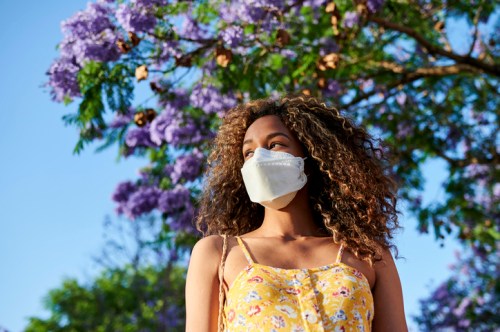Wait, Does a Mask Protect Me if I’m the Only Person Wearing One?
An infectious disease researcher answers the question "does one-way masking work?" and how to protect yourself.

Despite the fact that most Americans support mask requirements on shared transportation, a federal judge struck down President Biden’s mask mandate for people on airplanes and other modes of travel on April 18. Several aircraft carriers have dropped their mask mandates as a result. But if you still feel compelled to mask up before your next flight or subway ride, you may be wondering if one-way masking is effective.
Experts in This Article
Mary Rodgers, PhD, is the principal scientist in Abbott’s diagnostics business. At the beginning of the pandemic in 2020, Mary and her team were part of the development of many COVID-19 tests – including BinaxNOW – and have been tracking the virus and its variants since then to help mitigate the spread.
First, let’s discuss why masks are a useful form of protection against COVID-19. “Masks help to decrease transmission of COVID-19 by limiting the distance that respiratory droplets can travel and spread when people cough, sneeze, speak and more,” says Mary Rodgers, PhD, an expert in infectious diseases with Abbott. “Medical-grade masks that have multiple layers, like KN95s, can even help to filter particles containing viruses, including SARS-CoV-2 that causes COVID-19.”
As Dr. Rodgers’ definition implies, masks are a way of looking out for your fellow human beings. They are designed to protect the community around you from contracting SARS-CoV-2, and according to the Center for Disease Control and Prevention (CDC), they are an effective way to help prevent the spread of the virus. But what if no one else is masking? Does that count for anything?
“We’ve seen that masks do ultimately work best if everyone in the room—or on the plane—is wearing one. However, I wouldn’t let that discourage anyone from choosing to wear a mask if others aren’t,” says Dr. Rodgers. There is evidence that masks help protect the wearer, even if others aren’t masking, she says.
With that info in mind, Dr. Rodgers recommends wearing a high-quality mask like an N95 or a KN95 that fits snuggly against your face. “In fact, scientists wear N95 masks to protect ourselves in biosafety level three laboratories where we work with live SARS-CoV-2 virus, so this kind of protection is the gold standard,” she adds.
However, it’s important to also integrate other protective measures—especially if the folks around you aren’t masking. “I recommend assessing your level of risk and continuing to take proper precautions, including getting vaccinated and boosted, wearing a mask in indoor settings, attempting to maintain a distance from others, and testing before and/or after gatherings with rapid tests to help prevent the spread,” she said. This is particularly important if you’re in a high-risk COVID-19 population.
If you’re feeling lukewarm about continuing to mask up now that you don’t necessarily have to, Dr. Rodgers suggests you consider the collective good. “I still encourage people to make cautious decisions when it comes to COVID-19 and think about the others around them. Not all kids are eligible for the vaccine, and there are many people who are immunosuppressed,” she says. “Plus, we’re still seeing long-term effects from COVID even in people with mild illness.”
Oh hi! You look like someone who loves free workouts, discounts for cutting-edge wellness brands, and exclusive Well+Good content. Sign up for Well+, our online community of wellness insiders, and unlock your rewards instantly.
Sign Up for Our Daily Newsletter
Get all the latest in wellness, trends, food, fitness, beauty, and more delivered right to your inbox.
Got it, you've been added to our email list.










